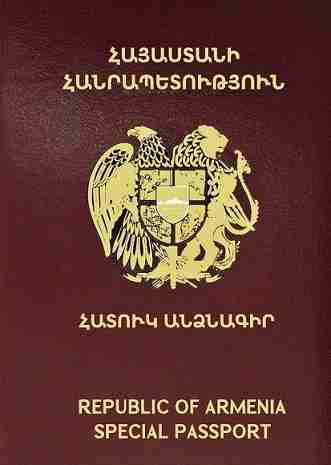Special Residency
The special residence permit, also known as the special passport, is valid for ten years and can be extended indefinitely in ten-year increments. Unlike the temporary or permanent residence permits, it is issued in the form of a passport rather than a card. It grants its holder the freedom to travel to and from Armenia without a visa, live, work, study, conduct business, and engage in any lawful activity in Armenia without needing work permits or any other paperwork.
Stay informed with our newsletter—get the latest news, legal updates, and expert advice on citizenship
Disclaimer: Please note that the original content of the website is in English, and translations into other languages are provided through an online translation tool; for precise information, please refer to the English text.
1. Benefits of Special Residency of Armenia
Securing an Armenian special residence permit offers a host of benefits in a country known for its rich cultural heritage and emerging economic prospects. Below are the essential advantages and procedural details for obtaining residency in Armenia:
Effortless Application Process
- Remote Application: Applicants can conveniently apply for Armenian residency remotely, either through an Armenian embassy or via an authorized representative holding a Power of Attorney (PoA), provided they have an Armenian entry stamp in their valid passport.
Lifestyle and Legal Benefits
- Family Inclusivity: The Armenian residence permit extends to family members, including spouses, minor and adult children, siblings, and grandparents, fostering a family-friendly environment.
- Economic and Cultural Appeal: Armenia is experiencing rapid economic growth, with an impressive 8.7% GDP increase in 2023. The country offers lucrative investment opportunities, including high-yield banking options and a vibrant real estate market where foreign land ownership is fully permitted. Yerevan, the capital, is renowned for its safety, affordability, high-speed internet, accessible healthcare, and culinary excellence. Residents can enjoy Armenia's UNESCO World Heritage Sites and the breathtaking scenery of Mount Ararat.
- Comprehensive Legal and Social Rights: Armenian residents are afforded all constitutional rights and freedoms, excluding political rights. These rights encompass access to healthcare, social security, education, property ownership, and privacy, as well as freedoms of speech, religion, and belief. Notably, residents are exempt from mandatory military service.
Global and Economic Connectivity
- Strategic International Relations: Armenia maintains robust diplomatic ties with Western countries, including those in the European Union and the USA. Additionally, the country offers visa-free access to nations such as Russia, Iran, and China, significantly enhancing travel opportunities for residents.
- Investment and Banking: Residents gain access to comprehensive banking services and investment options. Notable incentives include the right to permanent property and land ownership, which are particularly attractive to real estate investors.
Special Residency and Unique Entitlements
- Healthcare Access: Special passport and permanent residence permit holders can access primary healthcare services by registering with a designated family physician, receiving complimentary healthcare as part of Armenia’s healthcare framework.
- Customs Privileges: Individuals holding special or permanent residency passports are eligible to obtain a permanent residence certificate, which allows for the importation of personal belongings without customs fees. The certificate is typically issued by the Migration and Citizenship Service within five business days and can be applied for remotely through a representative for those with prior visits to Armenia.
- Agricultural Land Ownership: Special residency holders are uniquely entitled to own agricultural land in their name, a privilege granted under Armenian law.
2. The Application Procedure
In practice, special passports are primarily issued to foreigners of Armenian descent, specifically ethnic Armenians. However, in exceptional circumstances, non-Armenians who actively engage in economic or cultural activities in Armenia may also be eligible to receive a special passport. Additionally, children under the age of 16 can obtain special passports. The typical processing time for acquiring a special passport ranges from 60 to 90 days.
The specific steps, timeline, and required documentation will vary depending on the nature and legal basis of your application. Generally, the process involves the following stages:
Step 1: Document Preparation
Begin by gathering all necessary documents, which may include a birth certificate, marriage certificate, proof of Armenian ethnicity, or other supporting materials. These documents may require additional certifications, such as consular legalization or an Apostille. Providing complete biographical information is also essential to fill out the required application forms accurately.
Step 2: Booking an Appointment
Appointments at the Immigration Office must be scheduled in advance using the online booking system: https://migration.e-gov.am/en/. The waiting period for appointments can vary from a few weeks to several months.
Step 3: Visit Armenia
For those submitting their special residency applications at an Armenian embassy or consular office abroad, processing times may be extended as documents must be transferred to and from Armenia. If you opt to apply directly in Armenia at the Migration and Citizenship Service, your stay should generally be sufficient at 2-3 days for document translation and application submission. On the day of application submission, the government fee of AMD 150,000 (around USD 390) should be paid. Be sure to verify visa requirements for your country and whether an invitation letter is necessary. Alternatively, if you wish to submit your application through a representative with a Power of Attorney, you will need to send your original passport and supporting documents to Armenia.
Step 4: Tracking Your Application
After submitting your application for special residency, the processing time is typically 2.5 to 3 months. During this period, your application will be reviewed by both the Migration and Citizenship Service and the National Security Service. If any questions or concerns arise regarding your documents, security officials may reach out to you or your legal representative for additional information or documentation. Once a decision is made, you or your lawyer will be notified by the Migration and Citizenship Service.
Step 5: Collecting the Residence Permit
If your application was submitted in Armenia, a designated representative can collect your residence permit on your behalf using a Power of Attorney. This eliminates the need for your physical presence.
For special residency application based on Armenian ethnicity, applicants must provide documentation that verifies their Armenian heritage. Acceptable forms of proof include:
- Baptism Certificate: A baptism certificate issued by one of the recognized church organizations, as specified by a governmental decree, that confirms the applicant's or their parent’s Armenian ethnicity. This certificate must be authenticated by the Armenian embassy or consulate in the country of issuance.
- Birth or Ancestral Certificate: A birth certificate or any other government-issued and certified document confirming Armenian ethnicity, which may pertain to the applicant, their parent, grandparent, or sibling.
There are no specific requirements regarding the number of days you need to spend in Armenia to maintain your residence status. Generally, it is possible to apply for and extend your residence permit remotely. Please refer to the previous section for further details on this matter.
Armenian residents are generally required to have a registered address, which is used for official notifications and other purposes. Foreigners typically have 15 days after receiving their residence permit to register their local address and seven days to report any changes of address to the local police office. To register a local address, you will need to provide proof that you reside in Armenia. This can be a certificate of ownership or lease of a residential property, or the owner's consent to registration. If none of these documents are available, you may request the local police to conduct a factual check, which usually takes up to two weeks, to confirm your residency at the stated address.
Completing the address registration step can also be beneficial for the bank account opening process, as it's a requirement of most banks.
Once your address is registered, you may apply for a social security number (SSN), which may be useful in your dealings with various government agencies, banks, employers, etc. The SSN is issued in the form of a separate paper and can be obtained immediately upon application at the local police office.
In practice, individuals who are lawfully present in Armenia have the opportunity to obtain a Social Security Number (SSN) using their passport.
Special passport holders and citizens enjoy the legal provision granting extended family members (comprising parents, siblings, spouses, children, grandparents, and grandchildren) eligibility for a 1-year temporary residence permit. Furthermore, after sustaining uninterrupted residence as dependents for a continuous period of 3 years, family members can qualify for a 5-year permanent residence permit, contingent upon demonstrating adequate housing and financial means.
It is important to note that obtaining a residence permit (temporary, permanent, or special) does not automatically make you a "tax resident." Tax residency is regulated by tax laws, not immigration laws. In general, you become a tax resident of Armenia by spending more than 183 days in the country in a year. This means that it is possible to hold a residence permit without becoming a tax resident, and vice versa.
Please be aware that if you are employed as a worker or are a "private entrepreneur" in Armenia, you may be required to begin making social (pension) and military contributions once you have obtained your residence permit.
Armenia does not typically tax individuals' capital gains on the sale of securities or real estate, or other assets, regardless of whether those gains are generated in Armenia or elsewhere. Certain forms of income, such as insurance and pension payments, are also exempt from taxes. Additionally, there are no taxes on gifts, inheritance, or net worth.
However, there is no general rule that exempts a tax resident from paying taxes on income generated outside of Armenia.
You may also be able to obtain documents such as proof of registered address in Armenia, a social security number, a taxpayer identification number, a tax residency certificate, or a certificate of permanent residency.
Taxpayer Identification Number
Individuals receiving profits from commercial organizations are mandated to obtain a Taxpayer Identification Number (TIN). This is imperative, as the distribution of profits entails the obligation to remit income tax on dividends, necessitating the possession of a TIN for tax payment purposes. Furthermore, certain foreign banks may request the Taxpayer Identification Number as a means to authenticate their association with the Republic of Armenia.
The application process primarily involves the submission of a TIN application along with a copy of the passport.
Tax Residency Certificate
In general, an individual can become a tax resident of Armenia if their stay in the country extends to 183 days or more. Alternatively, a petition can be submitted to the tax office to procure a tax residency certificate, even if the stipulated duration of 183 days is not met. However, the application must substantiate that the center of vital interest is situated in Armenia, signifying that personal or business affiliations with Armenia outweigh those with any other country. It is crucial to note that such certificates are issued exclusively for a specific tax year and explicitly cite the pertinent double tax treaty.
To initiate the application for a tax residency certificate, the applicant is required to submit a comprehensive set of documents. These include statements detailing income from foreign sources, copies of all passport pages, a calculation table reflecting the individual's presence within the Republic of Armenia, or a written justification outlining the localization of the center of vital interests within the territory of the Republic of Armenia, supported by relevant documentation.
The issuance of the tax residency certificate is typically completed within two business days.
Contact Us for Assistance
Whether you have a specific concern or just need some preliminary advice, our team is here to help. Fill out the form below, and one of our experts will reach out to you shortly. No strings attached, and absolutely free.
Prefer to talk instead? Click the button below to book a free call with one of our experts at a time that works for you.
Your Privacy Matters to Us
Rest assured, any information you provide will be treated with the utmost confidentiality. We firmly believe in the principle of data privacy. That means we will not sell, rent, or lease our contact lists to any third party, and your personal details will never be handed over to individuals, government agencies, or companies.
3. Maintenance and Renewal
Residence permits must be renewed (extended) periodically (every 10 years in case of special residency). There are no restrictions on the number of times a residence permit can be extended, and there is no requirement to spend a particular number of days in Armenia to extend the residence permit.
The application for renewal for the special residence permit is recommended to apply at least 60 days before the expiration. If there are family members (dependents), the main applicant should apply even earlier to allow sufficient time for processing both their own and their dependents' applications.
The renewal procedure is similar to that of the initial application.
The 10-year special residence permit is uniquely issued in the form of a passport, distinguishing it from other types of residence permits. This special passport features a red cover, in contrast to the blue passport issued to citizens of the Republic of Armenia.



